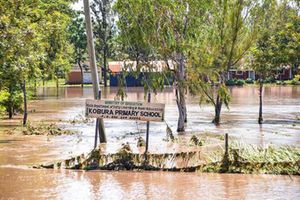Why big rush for new CBC?

Pupils from Camp Brethren Christian School warm up before taking part in a clean-up exercise at Morgan trading centre, Gilgil. The exercise is part of the Competence Based Curriculum (CBC).
The Competency-Based Curriculum (CBC) was introduced in 2017 to replace the 8-4-4 education system. CBC emphasises a paradigm shift from a teacher- to student-centred syllabus.
It equips individual learners by developing their tacit skills and capabilities, thereby making them problem solvers, innovators and inventors.
The new system also determines what the learner understands and can do in the real world without necessarily relying on work and encourages self-employment. The emphasis is on “to do”, not “to know”.
The country has taken CBC as the vehicle to socioeconomic development, social justice and poverty eradication.
This is, however, dogged by challenges of resources constraints, wrong timing and low parental goodwill. Building enough classrooms for CBC requires heavy capital investment upfront. How will schools accommodate double intake in January?
The prevailing acute infrastructural deficit was occasioned by the policy of 100 per cent transition from primary to secondary school that forced conversion of seven- to nine-streamed schools with inadequate trained teachers and land for expansion.
When 8-4-4 was introduced in 1985, it was touted as the programme that would inculcate skill into the learner, such that upon completing school they would find their footing in the job market. Subjects such as art and craft, music, home science and agriculture were made compulsory at the primary level.
I vividly remember how we weaved baskets, made woolen baby booties and made and played wandindi (stringed musical instrument), to mention a few. That shows the focus on competency and hands-on skills is not a new concept in our education system.
But we ought to re-think the timing of the implementation of CBC. Our economy has taken a nose-dive due to effects of Covid-19, locust invasion and Russia-Ukraine war. The country is experiencing drought and famine that has wiped out livelihoods with families and communities relying on relief food. I beseech the drivers of CBC to put it on hold.
Ms Mugera is a PhD Information Science Fellow at Kenyatta University. [email protected]





